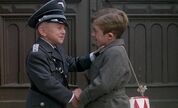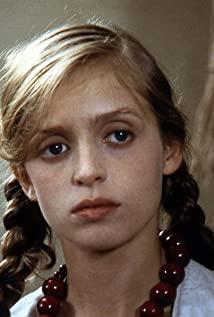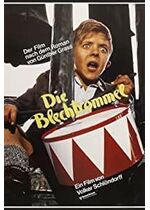-
Kyleigh 2022-03-29 09:01:09
Oscar, who refuses to grow up, sees the naked maid acting like a desire to return to his motherhood, then the ugliness of sex destroys the first woman he loves, the cruelty of war takes away the second one he loves, a The series of absurd realities also document the social conditions of Germany during the war. The subjective lens at birth, the relationship between the father, mother, uncle and uncle reflected in the mirror, the mother eating fish and the dwarf "government" are all...
-
Keshaun 2022-03-28 09:01:13
The ominous child is too powerful to see so many metaphors. This is also considered the best foreign language film Oscar in 1979. Different eras have different interpretation...
-
Aaliyah 2022-03-28 09:01:13
The version I watched seems to be missing a few minutes at the end, so I don't know what the real ending is. I can see all the innuendos and metaphors in the movie, but I don't understand what they refer...
-
Izabella 2022-03-28 09:01:13
A bizarre childhood history full of political metaphors, unable to interpret it, so I flipped through a few comments, and the most agreeable analysis I saw was to use the image of Oscar as a metaphor for a generation of intellectuals during the Third Reich, while the tin drum and the The shouting refers to the conscience and discourse style of the intellectuals, respectively. Taking this as a guide and then looking back at the film, part of the plot and expressions are quite...
-
Summer 2022-03-28 09:01:13
This is the film that won the Oscar for Best Foreign Language Film in 1980 and the novel that won the Nobel Prize for Literature in 1999. The movie looks at the absurd world of Germany during World War II from the eyes of a child who doesn't want to grow up. It is a movie full of meanings of life. Rigorous Germans who make movies are also very faithful to the original book, but those who haven't read the original book understand this film. It's more difficult, and it's time to do more...
-
Jason 2022-03-28 09:01:13
The perspective and narrative of this evil child are too special. After reading it, I strongly request to read the original work. From his crazy destruction of the adult world, from his stubborn insistence on not growing up, from the dramatic metaphor of each character, it constitutes a historical depiction of the eve of World War II. Movies generally use dolly zoom, and there are quite a few shots that regress from close-up to wide-angle, which is worth learning...
-
Alexandrine 2022-03-28 09:01:13
Under the prestige, it is actually difficult to match. I think that as a fantasy reality fan, the film is obviously too rigid. It's straight-forward, and the sense of absurdity is really lacking. The director doesn't let go at all. In fact, the direction of the film is obvious, but some parts really don't understand, such as what happened to the "black chef". ....
-
Kelsie 2022-03-28 09:01:13
[Return of Shanghai Film Festival] Schlondorf's masterpiece, won the Palme d'Or and Oscar. Adapted from the novel of Günterglass, the film reveals the history of Danzig through the ups and downs of the dwarf's life and weird perspective, the contradictions of human nature and the darkness of the Nazis, the absurdity and strangeness are tragic sadness. Impressive scenes: perspective from the womb, blue Danube, sex and soda powder, horsehead eel, child and drum, the ending is pulled away from the...
-
Margarita 2022-03-28 09:01:13
Oscar beats a tin drum and speaks with a shrill voice, telling about Germany, a fairy tale of an era... The specter of politics is possessed by the whole film. If you are tangled, you should give it six...
-
Bettye 2022-03-28 09:01:13
The most absurd, the most wretched, the darkest, the most twisted, the dwarf... of all, absurd life. The film is startling at the beginning, and then people watch it in all kinds of surprises, all kinds of nausea, all kinds of incest, all kinds of feelings of strangling Oscar. In the case of no subtitles, I still watched the two and a half hours of Evil Xiaosheng's performance. I admired the film and myself at the same...
The Tin Drum Comments
-
Pedro 2022-04-23 07:05:22
The Tragedy of Destiny Chased by the Times
A drum beat, a war broke out, a tragedy unfolded. The film "Tin Drum", with its absurd tone, cold and low color flow, and heart-touching Yufa, is a tragedy of destiny, under the interweaving of bizarre and reality, between the era and the game of resistance. The film tells the story with the...
-
Kadin 2022-03-21 09:03:26
love, or betray
In one afternoon, I watched the movie "The Tin Drum".
Unrecognized love is painful. For example, the relationship between my mother and my uncle was a tragedy from the very beginning. This is a world where ethics are normal. Random swords cut love, change to a Chinese woman, or do it, but a...
-
Schugger-Leo: A beautiful day! She's gone to the place where everything's so cheap. Habemus dominum
Sigismund Markus: [Leo opens the door for Markus to let him into his taxi] Yes, it's a beautiful day. An unforgettable day. I too have seen the Lord.
Schugger-Leo: You've also seen the Lord?
[looking at Oskar]
Schugger-Leo: Oskar. Habemus dominum, Oskar!
-
Maria Matzerath: [Oskar walks in secretly to find Alfred having sex with Maria] A little more. Just a little. But be careful
Alfred Matzerath: Don't worry
Maria Matzerath: Almost. Almost. Just a little more! But be careful!
[Oskar jumps on Alfred, interrupting their sexual act. Alfred gets up and slaps him before the upset Maria stops him]
Maria Matzerath: Alfred, stop it! Is it the kid's fault you're not careful?
Alfred Matzerath: Me? Who kept asking for more?
Maria Matzerath: I said, 'Be careful, it's coming soon.' But it never came at all!
Alfred Matzerath: Never enough. You're all the same
Maria Matzerath: In, out, finished. That's your idea of love. Well, go look for somebody else. You think I am some electric bell? You never take precautions!
Director: Volker Schlöndorff
Language: German,Italian,Hebrew,Polish,Russian,Latin Release date: April 11, 1980










